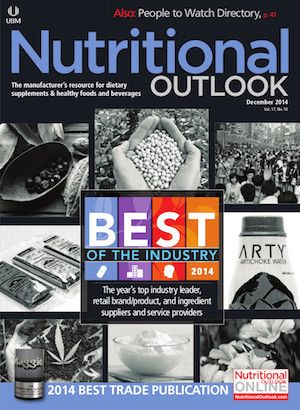Gender Gap Closing among U.S. Supplement Users, 2014 Survey Shows
CRN’s national survey reveals new trends, including growing supplement usage by men.
New data from the Council for Responsible Nutrition’s (CRN; Washington, DC) 2014 Consumer Survey on Dietary Supplements indicate that dietary supplement usage in the United States remains steady. The survey also reveals some interesting trends, especially regarding supplement usage by men versus women.
Supplement usage overall appears healthy. The percentage of U.S. adults who reported taking dietary supplements is the same in 2014 as it was in 2013-68%; moreover, more than 50% of survey respondents in 2014 said they are regular supplement users.
Gender and age-group analysis provides some interesting insights-most notably, that supplement usage between the sexes continues to equalize. According to 2014 survey results, usage by women and men differed by 6 percentage points (71% women; 65% men). Compare this to previous years, during which this gap was greater: 8 percentage points in 2013 (72% women; 64% men) and 12 percentage points in 2012 (74% women; 62% men).
Age-group analysis reveals which supplements are most popular among groups. All age groups are fans of vitamins and minerals, the most popular supplements category by far. Usage was fairly even among age groups (98% baby boomers; 97% elderly; 95% Generation X; and 95% Generation Y). But more elderly customers take specialty supplements (51%), compared with baby boomers (46%), Generation X (40%), and Generation Y (25%).
While older customers are slightly heavier users of vitamin, mineral, and specialty supplements, younger customers lead in the areas of herbal/botanical supplements and sports nutrition/weight management supplements. Generation X was the highest user of herbal/botanical supplements (29%) in 2014, compared to baby boomers (27%), elderly customers (24%), and Generation Y (23%). Generation X was also the highest user of sports nutrition and weight-loss supplements, followed by Generation Y (24%), baby boomers (18%), and the elderly (10%).
CRN says it will continue to release findings from the survey throughout next year.
The 2014 survey comprises a national sample of 2,010 U.S. adults aged 18 and older. Ipsos Public Affairs conducted the CRN-funded survey online August 25-29, 2014. Weighting was employed to ensure that the survey’s sample population accurately reflects the overall U.S. adult population according to Census data.
Dietary supplements have encountered some negative media coverage this year, but Judy Blatman, CRN’s senior vice president of communications, points out that supplement usage remains high despite this. A full 83% of consumers surveyed in 2014 said they are confident in the safety, quality, and effectiveness of dietary supplements. “Although our industry received its fair share of bad publicity this year, we believe that confidence remains high because people realize there is a legitimate and responsible majority of companies in our industry whose top priority is to ensure product quality so that consumers can not only maintain good health, but also maintain brand loyalty. Smart consumers pay attention to finding the right companies and products for them,” says Blatman.
Jennifer Grebow
Editor-in-Chief
Nutritional Outlook magazine jennifer.grebow@ubm.com
Infographics courtesy of the Council for Responsible Nutrition

The Nutritional Outlook Podcast Episode 39: Nutritional Outlook's Ingredients to Watch in 2025
February 25th 2025In this episode, Nutritional Outlook interviews Scott Dicker, market insights director from market researcher SPINS, about ingredients and product categories nutraceutical and nutrition product manufacturers should watch in 2025.
Prinova acquires Aplinova to further increase its footprint in Latin America
April 7th 2025Prinova has recently announced the acquisition of Brazilian ingredients distributor Aplinova, which is a provider of specialty ingredients for a range of market segments that include food, beverage, supplements, and personal care.




















